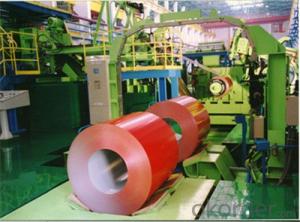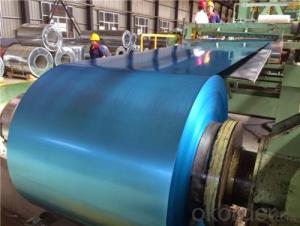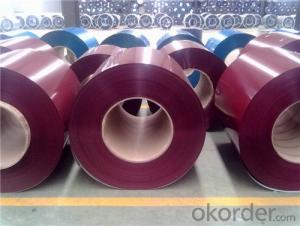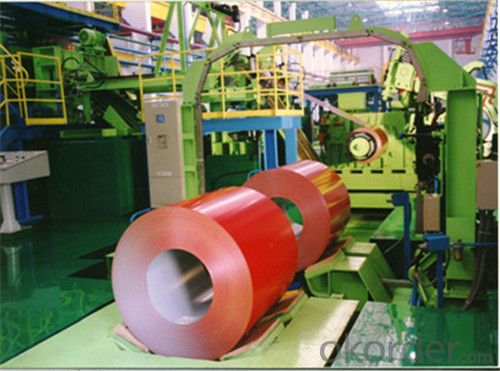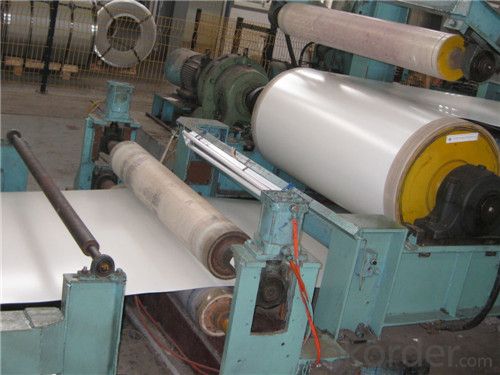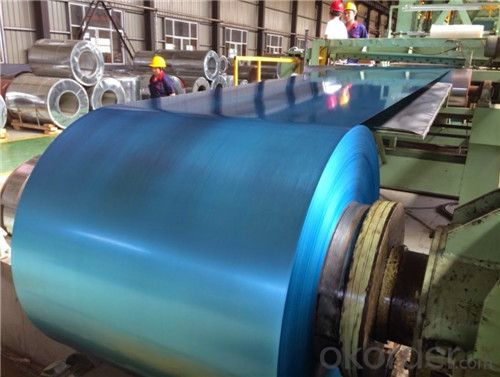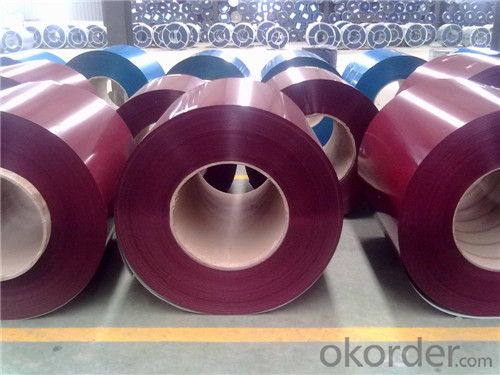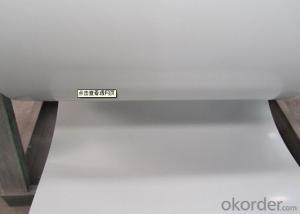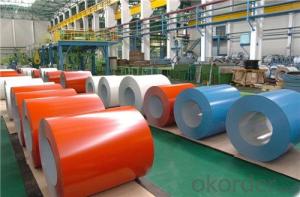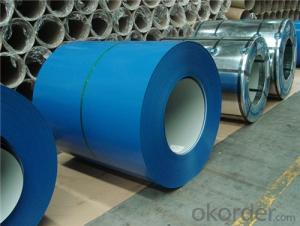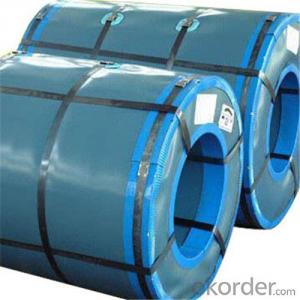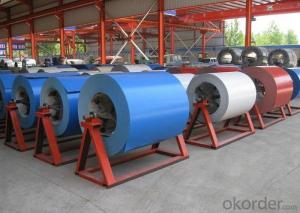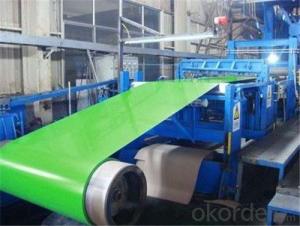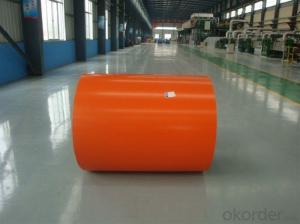Prepainted Rolled Steel Coil for construction roofing Constrution
- Loading Port:
- Shanghai
- Payment Terms:
- TT OR LC
- Min Order Qty:
- 50 m.t.
- Supply Capability:
- 30000 m.t./month
OKorder Service Pledge
OKorder Financial Service
You Might Also Like
Structure of Prepainted Rolled steel Coil for Construction Roofing
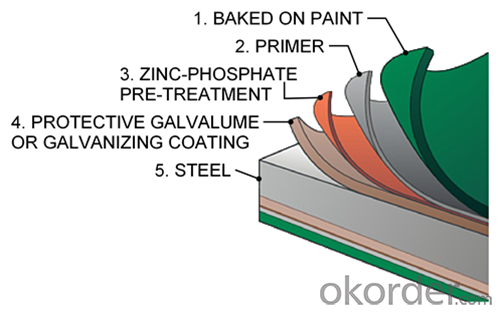
Description of Prepainted Rolled steel Coil for Construction Roofing
Prepainted Rolled steel Coil is a kind of coated steel coil/sheet. With the cold rolled steel of different strength and thickness as substrate, it is produced through applying Al-Zn coat on both faces by hot dip process. In its coating, Al accounts for about 55%, Si 1.6%, while the remaining is Zn. Aluminum zinc coils enjoys both the physical protective feature and durability of Al and the electrochemical protective property of Zn. And its surface has bright silver color and regular embossed-like figure, which are highly decorative.
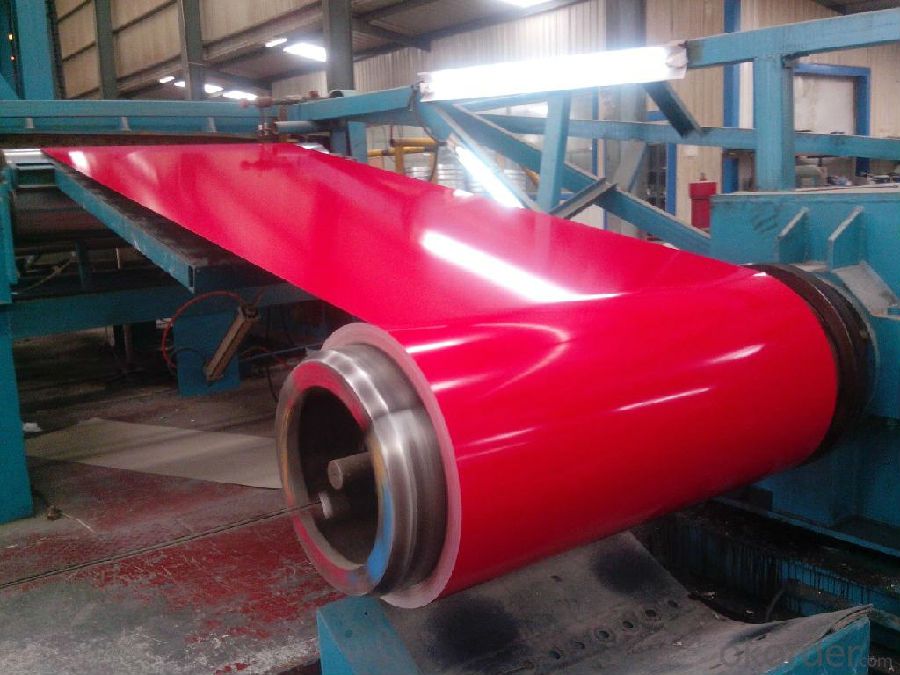
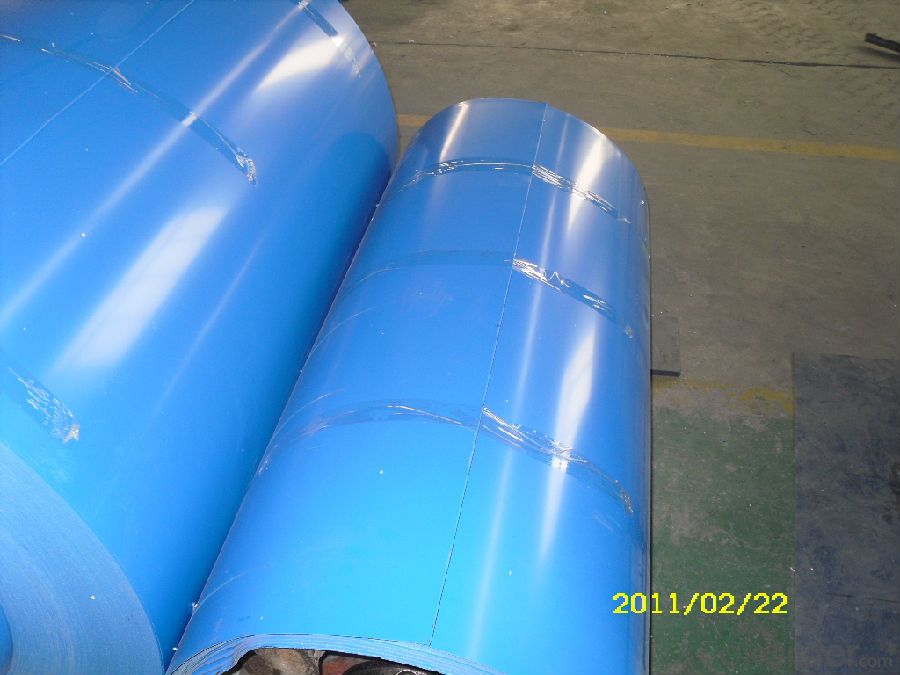
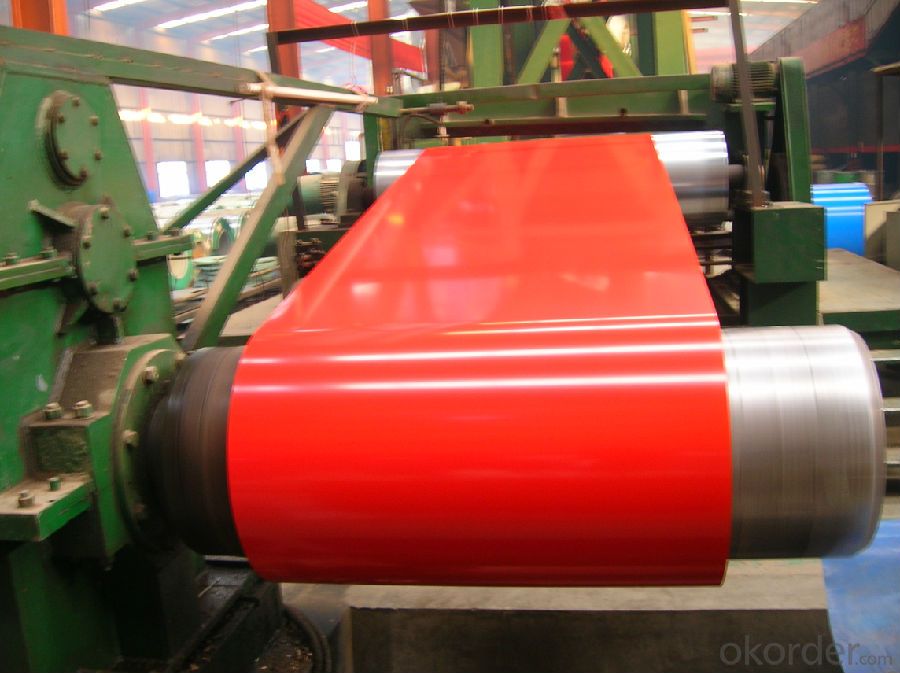
Main Feature of Prepainted Rolled steel Coil for Construction Roofing
1.Corrosion resistance: It mainly depends on the aluminum protection. When the zinc being worn, the aluminum will form a dense layer of aluminum oxide, resist corrosion material to prevent further corrosion inside.
2. Heat resistance: Aluminum zinc alloy steel sheet has excellent heat resistance, can withstand high temperatures over 300 centigrade, and is similar with aluminized steel high temperature oxidation resistance. It often used in chimney pipes, ovens, fluorescent lighting device and the device cover.
3. Heat reflective: Galvanized steel plate heat-reflective high rate is twice as galvanized steel, often used to make insulation materials.
4. Economy: Because density of 55% AL-Zn is smaller than the density of Zn, so in the same weight and thickness of Galvanized zinc layer, aluminum-zinc steel plate is larger area more than 3% of galvanized steel sheet.
Applications of Prepainted Rolled steel Coil for Construction Roofing
1. Construction and building: roofing; ventilating duct; handrail; partition panel;etc.
2. Electric appliance: refrigerator; washing machine; refrigerator; DVD;etc.
3.Transportation: oil tank; road sign; etc.
4.Agriculture:barn; etc.
5.Others:vending machine; game machine; etc.
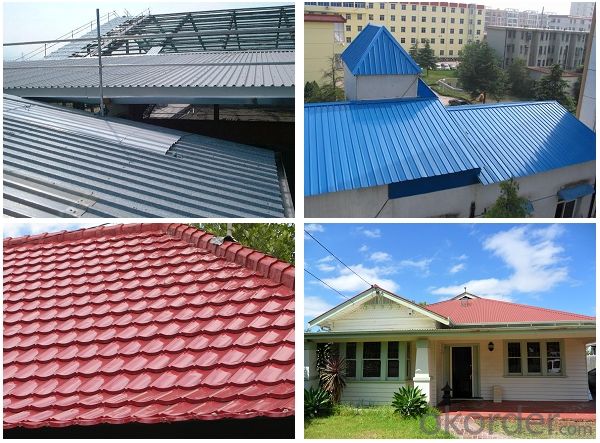
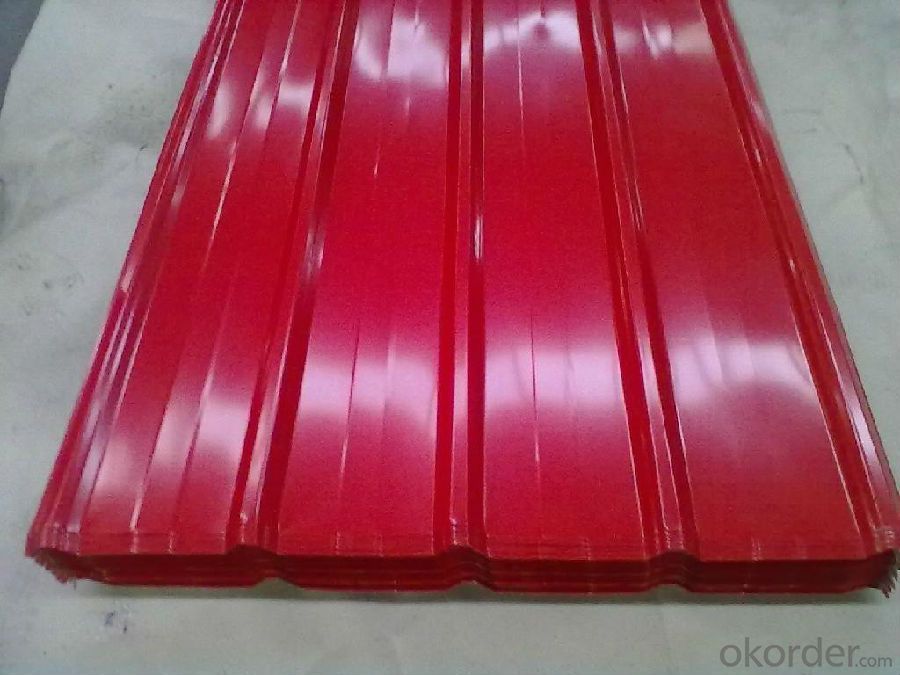
Specifications of Rolled steel Coil for Construction Roofing
Product | Prepainted Rolled steel Coil for Construction Roofing |
Material Grade | SGCC / SGCH / DX51D+AZ, etc |
Thickness | 0.2-3.0mm |
Width | 600-1500mm |
Tolerance | Thickness: +/-0.02mm , Width:+/-2mm |
Zinc-coating | AZ40-150g/m2 |
Technique | Raw material: Hot rolled steel coil --> Cold rolled_>hot dipped galvalume |
Surface | Dried, Chromated, Unoiled |
Spangle | Regular spangle , small spangle, zero spangle |
ID | 508MM |
Coil weight | 10MT max |
Export package | Cardboard inner sleeves, Waterproof paper, galvanized steel covered and steel strip packed |
FAQ of Prepainted Rolled steel Coil for Construction Roofing
We have organized several common questions for our clients,may help you sincerely:
1. What is the minimum order quantity ?
Our MOQ is 50mt for each size. And we will consider to give more discount if you make big order like 1000 tons and more. Further more, the more appropriate payment term your offer the better price we can provide.
2. How long can we receive the product after purchase?
Usually within thirty working days after receiving buyer’s advance payment or LC. We will arrange the factory manufacturing as soon as possible. The cargo readiness usually takes 15-25 days, but the shipment will depend on the vessel situation.
3. How to guarantee the quality of the products?
We have established the international advanced quality management system,every link from raw material to final product we have strict quality test;We resolutely put an end to unqualified products flowing into the market. At the same time, we will provide necessary follow-up service assurance.
- Q: How are steel coils used in the production of steel fasteners?
- Steel coils are used in the production of steel fasteners as they serve as the raw material for manufacturing various types of fasteners such as screws, bolts, nuts, and washers. The steel coils are unwound and then processed through machinery that cuts, shapes, and forms them into the desired fastener shape. This allows for efficient and precise production of steel fasteners, ensuring their strength, durability, and compatibility with various applications.
- Q: What are the common methods of cutting-to-length steel coils?
- There are several common methods used for cutting-to-length steel coils, depending on the specific requirements and capabilities of the industry. 1. Shearing: This method involves using a shear blade to cut the steel coil into specific lengths. Shearing is typically used for thinner gauge materials and is a cost-effective method for high-volume production. 2. Slitting: Slitting is a process that involves passing the steel coil through a set of rotating circular blades. These blades cut the coil into narrower strips of the desired width. This method is commonly used for thinner gauge materials and is ideal for producing narrow strips or multiple widths from a single coil. 3. Laser cutting: Laser cutting uses a high-powered laser beam to melt and vaporize the steel coil, resulting in a precise and clean cut. This method is suitable for a wide range of materials and can be used for complex shapes and contours. Laser cutting is often used for high-precision applications and smaller production runs. 4. Sawing: Sawing involves using a saw blade to cut through the steel coil. This method is commonly used for thicker gauge materials and is ideal for cutting large sections or heavy-duty applications. Sawing can be done manually or with the use of automated sawing machines. 5. Rotary cutting: Rotary cutting is a method that uses a rotary shear to cut the steel coil into desired lengths. This process is commonly used for thicker gauge materials and is suitable for high-speed production. Rotary cutting provides a clean and accurate cut, making it a popular choice in many industries. It is important to note that each method has its advantages and limitations, and the selection of the appropriate cutting method depends on factors such as the material thickness, coil width, required precision, production volume, and budget constraints.
- Q: How are steel coils coated or painted?
- Steel coils are typically coated or painted using a process known as coil coating. This involves a series of steps including cleaning, pretreating, applying primer, and applying the final topcoat. The coils are first cleaned to remove any dirt or contaminants. They are then pretreated to enhance adhesion and corrosion resistance. After that, a primer is applied to provide a base layer for the paint. Finally, the desired topcoat is applied using various methods such as roll coating, spray coating, or electrostatic coating.
- Q: How are steel coils loaded onto trucks or containers?
- Steel coils are typically loaded onto trucks or containers using specialized equipment such as coil lifters or coil hooks. These devices safely secure the coils and allow them to be lifted and positioned onto the truck or container. The coils are then secured in place using straps or other restraints to prevent them from shifting during transportation.
- Q: is a 1962 steel penny worth anything?
- 1962 D Penny
- Q: What are the different types of steel coatings for coils?
- There are several different types of steel coatings for coils, including galvanized coatings, galvannealed coatings, aluminized coatings, and organic coatings.
- Q: How are steel coils used in the manufacturing of safety systems?
- Steel coils are commonly used in the manufacturing of safety systems such as airbags and seat belts. The steel coils are formed into springs which provide the necessary tension and force to ensure the proper functioning of these safety devices. The coils are carefully designed and integrated into the system to enhance its performance and reliability, ultimately helping to protect occupants in the event of a collision.
- Q: What are the common coil weight and width combinations available for steel coils?
- The industry or application dictates the available common weight and width combinations for steel coils. However, steel coils are commonly available in the following weight and width combinations: 1. Light gauge coils: These coils have a weight range of 5 to 10 tons and a width range of 600 to 1,500 mm. Industries such as automotive, construction, and appliances frequently use them. 2. Medium gauge coils: These coils have a weight range of 10 to 20 tons and a width range of 750 to 2,000 mm. They find applications in manufacturing, infrastructure, and engineering sectors. 3. Heavy gauge coils: These coils have a weight range of 20 to 35 tons and a width range of 900 to 2,200 mm. Industries that require thicker and wider steel sheets, like shipbuilding, oil and gas, and construction of large structures, commonly use them. 4. Narrow coils: These coils have a width range of less than 600 mm and can have varying weights based on specific requirements. Industries that need narrower strips of steel, such as automotive components, electrical appliances, and packaging, often use them. 5. Custom coil sizes: Manufacturers can provide custom sizes, besides the standard weight and width combinations mentioned above, to meet specific customer requirements. This allows for flexibility in meeting the unique needs of various industries. It is important to note that these weight and width combinations are not exhaustive and can vary depending on the steel manufacturer, production capabilities, and customer demands.
- Q: What is the use for spring steel that take advantage of its unique properties?
- *Spring steel is a low alloy, medium carbon steel with a very high yield strength. This allows objects made of spring steel to return to their original shape despite significant bending or twisting. Silicon is the key component to most spring steel alloys. An example of a spring steel used for cars would be AISI 9255 (DIN and UNI: 55Si7, AFNOR 55S7), containing 1.50%-1.80% silicon, 0.70%-1.00% manganese and 0.52%-0.60% carbon. Most spring steels (as used in cars) are hardened and tempered to about 45 Rockwell C. the most widely used spring steel is ASTM A228 (0.80–0.95% carbon), which is also known as music wire. Spring steel is one of the most popular materials used in the fabrication of lock picks due to its pliability and resilience.
- Q: How are steel coils coated to prevent rust and corrosion?
- Steel coils are coated to prevent rust and corrosion through a process called galvanization. This involves immersing the coils in a bath of molten zinc, which forms a protective layer on the steel surface. This zinc coating acts as a barrier, preventing oxygen and moisture from coming into contact with the steel, thus reducing the risk of rust and corrosion.
Send your message to us
Prepainted Rolled Steel Coil for construction roofing Constrution
- Loading Port:
- Shanghai
- Payment Terms:
- TT OR LC
- Min Order Qty:
- 50 m.t.
- Supply Capability:
- 30000 m.t./month
OKorder Service Pledge
OKorder Financial Service
Similar products
Hot products
Hot Searches
Related keywords
